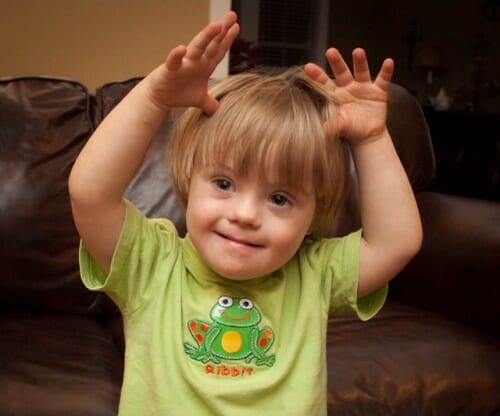Most people think of sign language as a method of communication for people who are deaf, but sign language for hearing children has become quite popular, especially among parents of children with special needs, such as Down syndrome, autism, cerebral palsy, and other conditions which are often accompanied by speech delay.
Some parents are wary, however – the most frequent question I’ve come across is, “Will learning sign language delay my child’s speech?” The answer is no – learning sign language will not hurt your child’s speech development. In fact, research has shown that using sign language actually increases a child’s verbal skills.
Research has shown that using sign language does not negatively impact a child’s language development later on, and actually does the opposite up to about age four. Some research even suggests that sign language may provide some long-term cognitive benefit, though more research needs to be conducted on the long term effects of using sign language early on.
The short-term gains for young children who sign are many.
Children can do signs (or gestures) before they are able to use words, allowing a child to start “conversations” with their parents and siblings earlier than they would be able to if they were waiting on their words – especially beneficial for children with speech delay. This interaction can increase parent and/or sibling bonding time. With signs, children are also able to request specific items. Anybody with a toddler has been through one of those moments when you cannot figure out what he wants – very frustrating for the parent and the child! If the child can sign, she will be able to tell you that she wants an apple, goldfish, or the giant stuffed elephant in the other room, reducing the frustration level of your child (and, for that matter, you!)
Anecdotally, many parents back up the research with their own stories. According to his mom, the boy in the photo above (signing “deer”), loved being able to use signs to communicate his needs and wants, and was more willing to use words, no matter how imperfectly. She reports, “It was a great help to us, because we were better able to understand his attempts at speech when they were accompanied by a sign. We could see there was a lot going on inside his head – signing enabled him to share his thoughts with us when his speech failed him.”
If you are a parent that is considering using sign language with your child, I hope you are reassured about the benefits of using sign language. It seems counterintuitive, but don’t worry – sign language won’t inhibit your child’s vocal skills, and there’s a good chance it may actually help.
Jessie Nelson Willis, M.Ed., CCC-SLP
Research on Sign Language in Young Children:
- Goodwyn, K., Acredolo, L., Brown, C. “Impact of symbolic gesturing on early language development.” Journal of Nonverbal Behavior.
- In this research article, they used two groups: a group where the parents used sign language and a group where the parents did not use sign language. The findings of this research were that children in the sign language group were able to express themselves earlier than the children that did not use sign language. The signs were very useful in the pre-verbal phase of children and helped cut back on frustrations during the time that the child was mobile but unable to talk. It allowed the children to request specific foods, toys, and even let the parents know when they did not like something. The article did state that benefits of sign language in young children were mostly ages eight months up to about four years.
- Barnes, Susan K. “Sign Language with Babies: What Difference Does It Make?” Dimensions of Early Childhood 38.1 (2010).
- This research article states some of the benefits of using sign language with hearing children: some children may throw temper tantrums because they are unable to verbally express themselves –it is thought to occur less for kids who have learned some sign language; toddlers get the chance to express their wants and needs earlier (during their pre-verbal phase). This research also indicated that 24 month olds were, on average, using words like they were 27-28 month olds. Children who were 36 months old were talking like they were 47 month olds. 96 month olds scored an average of 12 points higher in IQ than their non-signing peers, and so on, possibly contradicting the first study I noted above regarding long-term benefits of signing.








